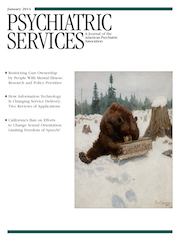The number of incarcerated women is rapidly rising, increasing 6% nationally over the past ten years. Whereas men and women with mental illness are twice as likely as persons without mental illness to return to jail within six months, the prevalence of mental health problems among incarcerated women (31%) is more than twice that of men. Evidence is limited concerning approaches that reduce jail recidivism for inmates with mental illness, although there has been some success with models incorporating peer mentoring and principles of respect, empathy, and connectedness. In addition to behavioral dysfunction, confounding factors for mental health clients obtaining and maintaining jobs are inadequate housing, lack of transportation, and poor interpersonal skills.
In July 2009 the Los Angeles County Mental Health Department inaugurated Peer Employment, Education and Recovery Support (PEERS) at the Women’s Community Reintegration Services and Education Center with the goal of enhancing opportunities to obtain employment, facilitate community reintegration, and reduce jail recidivism for women at risk of incarceration. The focus of the program is educational, with emphasis on the development of healthy work habits and relationships. The South Los Angeles Center is home to the county’s largest number of children placed out of home, rising rates of prostitution, and school truancy of 30%. There is continued high unemployment in neighborhoods still recovering from the 1991 riots that devastated local businesses. Opportunities for women seeking services at the center have been hampered by such life experiences as domestic violence, homelessness, and trauma. Ill equipped with life skills before entering jail, women have even fewer resources upon release.
Founded on the conviction that a person is more than his or her illness, the center’s approach to mental health care is holistic rather than traditional. Interacting in a manner that preserves dignity and conveys respect is the critical skill that fosters healthy relationships. Previous dysfunctional relationships often alienated women from their families and led to homelessness, continued victimization, and returns to jail.
Clients are welcomed by PEERS fellows who provide support through the assessment process. A clinician guides the individual in development of a life plan addressing needs, goals, resources, and a crisis-oriented intervention. Clients are encouraged to become an integral part of the life and community of the center and to take advantage of classes that focus on work-life balance, financial wellness, parenting, anger management, self-directedness spirituality, self-care, coping with addiction in families, job readiness, GED preparation, avoiding probation violation, and moral reconation therapy (MRT). Women apply for a PEERS fellowship as soon as they decide to pursue employment.
PEERS fellows reenter their communities while gaining an education, earning a stipend, receiving assistance to establish a home, regaining custody of their children, and developing a support network of colleagues with similar life experiences. Providing compensation aids women in rebuilding their lives and is important to enhance self-worth and dignity. Fellows work with staff to develop resumes and prepare clients for job placement interviews. On-the-job mentoring parallels PEERS fellows’ becoming an integral part of the center’s functioning, “giving back” through participation in MRT as leaders, and in community outreach while also working toward permanent employment. Improving life circumstances affords new challenges, such as relinquishing public assistance and being held accountable for repayment of previously incurred debt, and PEERS emphasizes the critical importance of a consistent but flexible support system.
Among the 29 PEERS enrolled in the fellowship during the first two years, 27 have not been arrested or incarcerated. Twenty (69%) completed the program, of whom 16 (80%) obtained permanent employment. The two women subsequently incarcerated completed the program but did not obtain permanent employment upon graduation.
Reflecting the South Los Angeles center’s demographic characteristics, PEERS fellows during that period were predominantly from ethnic minority groups (50% African American, 16% Latina, 16% self-identified as mixed race or other, and 9% Caucasian) and had low levels of education and incomes well below poverty level. More than half were chronically homeless, and most were in the process of obtaining, or were recently granted, custody of their three (on average) children.
Successful PEERS fellows share some characteristics. For example, they are mothers with a desire to raise their children. They want a better life for themselves and their families, they would like to reduce their reliance on public financial assistance, they have a desire to make differences in the lives of others who share similar life experiences, they are enthusiastic about learning, and they have the perseverance necessary to overcome continuous and varying challenges.
Women coping with the stigma of mental illness, dire social circumstances, and incarceration histories have few options for changing the trajectory of their lives. PEERS is a model of community reintegration with the potential to reduce incarceration, facilitate employment, and give previously incarcerated women hope.

